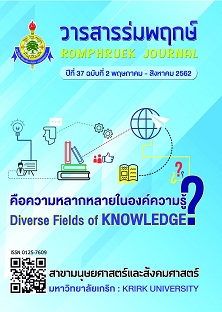Factors Related to the Willingness to Inherit the Family Business of the Generation Y Business Successor Group Phra Nakhon Si Ayutthaya Province
Main Article Content
Abstract
The objective of this research was to study factors related to the willingness to inherit the family business of the Generation Y business successor group. The sample sizes of this research were the Generation Y business successor group by using Purposive Sampling. The instrument of this research was a questionnaire. 210 questionnaires were completed and sent back. The data received were analyzed by descriptive statistics: frequency, percentage, mean, Standard Deviation and Logistic Regression Analysis.
The results indicated that two factors which were the factors of entrepreneurial orientation and personal need alignment were related to the willingness to inherit the family business of the Generation Y business successor group at statistical significance of 0.01. On the other hand, other three factors consisted of perceived of trust in the successor’s abilities, preparation level of the successor and perceived mutual acceptance of individual roles were related to the willingness to inherit the family business of the Generation Y business successor group at statistical significance of 0.05. Nevertheless, the results showed that the reward receiving from the business and the perception of the family harmony were not statistical significantly related to the willingness to inherit the family business of The Generation Y business successor group.
Article Details
Every article published in the Romphruek Journal of the Humanities and Social Sciences is the opinion and point of view of the authors. Thery're not the viewpoint of Krirk University or the editored department. Any part or all of the articles for pablication must be clearly cited.
References
กัลยา วานิชย์บัญชา. (2549). สถิติสำหรับงานวิจัย. กรุงเทพฯ : โรงพิมพ์จุฬาลงกรณ์มหาวิทยาลัย.
กระทรวงอุตสาหกรรม. (2559). ธุรกิจครอบครัว. (20 มีนาคม 2562) สืบค้นจาก
http://www.industry.go.th/industry/index.php/th/knowledge/item/10603-2016-05-23-05-38-40.
กรมพัฒนาธุรกิจการค้า. (2562). ข้อมูลนิติบุคคลรายจังหวัดปี 2562. สืบค้นจาก
http://www.dbd.go.th/ewtadmin/ewt/dbdweb56/news_view.php?nid=469407675.
ณัฐพร วิรุฬหการุญ และ วาสิตา บุญสาธร. (2560). ความรักและพลังขับเคลื่อนในงานของทายาทธุรกิจครอบครัว
ขนาดกลางขนาดย่อม. วารสารพัฒนบริหารศาสตร์, 57(1), 246-276.
ดาวพระศุกร์ ทองกลิ่น ปิยะฉัตร จารุธีรศานต์ อภิชา บุญภัทรกานต์ และ บุญชอบ พุ่มไพจิตร. (2561). ปัจจัยที่มีอิทธิพลต่อ
การกำกับดูแลกิจการของวิสาหกิจขนาดกลางและขนาดย่อมและผลการดำเนินงานสำหรับอุตสาหกรรมผลิตอาหาร
ในประเทศไทย. วารสารร่มพฤกษ์, 36(1), 10-32.
ปิยะพงษ์ ทองดี. (2561). ภาวะผู้นำขององค์การสมัยใหม่. วารสารร่มพฤกษ์, 36(1), 10-32.
ลภัสรดา โกมุทพงศ์ และ ประสพชัย พสุนนท์. (2559). ปัจจัยที่มีผลต่อการสืบทอดกิจการของทายาทธุรกิจ
เพศหญิงในประเทศไทย. วารสารธุรกิจปริทัศน์, 8(1), 107.
ศิระ อินทรกำธรชัย. (2554). ธุรกิจครอบครัวมีโอกาสรอดถึงรุ่น 3 เพียง 12% แนะวางแผนสืบทอดมรดก.
(2 ธันวาคม 2561) สืบค้นจาก
https://thaipublica.org/2014/05/pwc-handing-over-the-family-business-to-the-next-generation/.
สรรพงษ์ บำเพ็ญสันติ, ตะวัน วิกรัยพัฒน์ และ จุฬาภรณ์ ขอบใจกลาง. (2560). ปัจจัยที่มีอิทธิพลต่อการถ่ายโอนธุรกิจ
เคมีแบบครอบครัวในประเทศไทย. Journal of Community Development Research Humanities and
Social Sciences 2017, 10(1), 74-91.
หอการค้าจังหวัดพระนครศรีอยุธยา. (2562). กลุ่มผู้ประกอบการธุรกิจรุ่นใหม่หอการค้าจังหวัดพระนครศรีอยุธยา.
(15 มิถุนายน 2561) สืบค้นจาก https://web.facebook.com/young yutthaya/?rdc=1&_rdr.
อำพล นววงศ์เสถียร. (2552). การสืบทอดธุรกิจครอบครัว : ประเด็นสำคัญของความท้าทายเพื่อการอยู่รอดและยั่งยืน.
วารสารบริหารธุรกิจคณะพาณิชยศาสตร์และการบัญชี มหาวิทยาลัยธรรมศาสตร์, 32(124), 39-55.
อำพล นววงศ์เสถียร. (2558). คุณลักษณะภาวะผู้นำของผู้สืบทอดธุรกิจครอบครัวในธุรกิจครอบครัวที่มีผลต่อผล
การประกอบการของธุรกิจครอบครัว. วารสารวิชาการ สมาคมสถาบันอุดมศึกษาเอกชน แห่งประเทศไทยในพระราชูปถัมภ์
สมเด็จพระเทพรัตนราชสุดาฯ สยามบรมราชกุมารี, 21(2) .
Anderson, R. C., Reeb, D. M. (2003). Founding-family ownership, corporate diversification,
and firm leverage. J. Law Econ. , 46, 653–684.
Cronbach, Lee J. (1970). Essentials of Psychological Testing. New York : Harper.
E. Venter, C. Boshoff, G. Maas. (2005). The Influence of Successor-Related Factors on the Succession
Process in Small and Medium-Sized Family Businesses. Family Business Review, 18(4), 283-303.
Ian Burgess. (2017). EY Family Business Award of Ecellent Winners, EY Family Business Yearbook.
(May 29, 2019) Retrived from https://familybusiness.ey-vx.com/fb-yearbook-flipbook-2017/mobile/index.html#p=20.
Jose C. Casillas Ana M. Moreno and Jose L. Barbero b. (2010). Entrepreneurial orientation of family
firms : Family and environmental dimensions. Journal of Family Business Strategy, 2(2011), 90–100.
Mihalcea, A. D., Mitan A., and Vitelar, A. (2012). Generation Y : Views on Entrepreneurship”.
Economia Seria Management, 15 (2), 277-287.
PwC Global. (2014). Next Generation Survey : Bridging the gap : Handing over the family business
to the next generation. (May 29, 2019) Retrived from
https://www.pwc.lu/en/pwc-entrepreneur/docs/pwc-pwc-entrepreneur-bridging-the-gap.
Rovinelli, R. J., & Hambleton, R. K. (1977). On the use of content specialists in the assessment of criterion referenced test item validity. Dutch Journal of Educational Research, 2, 49-60.
Sharma, P. (2004). An overview of family business studies : Current status and directions
for the future. Family Business Review, 17(1), 1–36.
Stempler, G. L. (1988). A study of succession in family owned businesses. School of Business,
The George Washington University, Washington, DC.
Tapscott, D. (2009). Grown Up Digital. How The Net Generation Is Changing Your World,
New York : McGraw-Hill.
Twenge, J. M., Campbell, S. M., Hoffman, B. J., & Lance, C. E. (2010). Generational Differences in Work
Values : Leisure and Intrinsic Values Decreasing. Journal of Management, 36(5).


